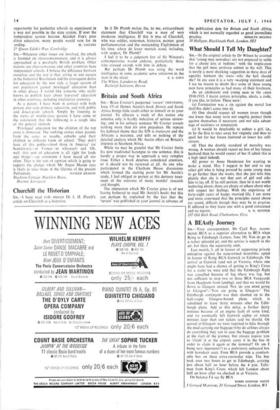Sts,—Whatever other issues are involved, the attack is founded on
class-consciousness, and it is always approached as a peculiarly British problem. Other nations are class-conscious and other countries have independent schools. I believe the difference between ourselves and the rest is that, owing to our success in the Industrial Revolution and the consequent desire for education by the new rich, a larger section of our population gained 'privileged' education than in other places. I would like someone who really knows to publish facts about 'top-crust' education in other countries, including totalitarian countries.
As a parent, I have been in contact with both private and state primary education, and with public and direct-grant schools. Simply by listening to the views of middle-class parents I have come to the conclusion that the following is a rough idea of the general opinion.
'Privileged' education for the children of the top crust is dismissed. The rankling comes when parents from the same, or nearby, suburbs send their children to different kinds of school. 'They don't have all this public-school thing in America' (or Scandinavia—or France—or wherever) and 'Oh, well. that sort of education is all right for lords and things'—are comments I have heard all too often. That is the sort of opinion which is going to support the change which Mr Angus Maude says is likely to take shape in the lifetime of the present






























 Previous page
Previous page